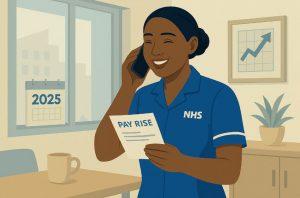The role of a registered mental health nurse (RMN) in the UK has never been more vital. As mental health becomes a national priority, the demand for skilled professionals in this field continues to rise. Alongside this growing demand, discussions around pay, benefits, and working conditions have also taken centre stage.
For both current professionals and those considering a career in mental health nursing, understanding the salary structure in 2025 is essential. This guide offers a detailed and updated analysis of the registered mental health nurse salary in the UK, with particular focus on London a city where opportunity and cost of living go hand in hand.
What is the Average Registered Mental Health Nurse Salary in the Uk in 2025?

In 2025, the salary for a registered mental health nurse in the UK typically ranges between £28,000 and £43,000 per year. This broad range is influenced by several variables including experience, location, and sector of employment. On average, most newly qualified nurses start at the lower end of the scale, while those with more years in practice or those working in specialised roles tend to earn towards the higher end.
This year, the NHS implemented incremental changes across all pay bands to better reflect inflation and workforce shortages. These adjustments have slightly boosted overall earnings for mental health nurses and are part of a wider effort to retain experienced staff in a healthcare system that continues to struggle with staffing gaps.
How Much Do Mental Health Nurses Earn Under NHS Pay Bands in 2025?
The National Health Service in the UK continues to use the Agenda for Change (AfC) framework to structure pay across different healthcare roles. Mental health nurses are commonly placed within Bands 5 to 7 of this framework.
A newly qualified nurse enters at Band 5, earning just over £28,000 annually. With more experience or added responsibilities, a nurse may progress to Band 6, which offers a salary starting around £35,000. Senior and specialised roles often fall into Band 7, where salaries can exceed £43,000 per year. These figures can increase further when shift enhancements and overtime are considered.
What sets the NHS apart is its structured approach to salary progression. Nurses can expect annual increases within their band, and additional rises when promoted to higher bands, creating a reliable trajectory for professional and financial growth.
What is the Salary for Mental Health Nurses in London Specifically?
Living and working in London comes with both higher expenses and additional salary supplements. Mental health nurses based in the capital receive the High Cost Area Supplement (HCAS) a financial incentive designed to offset the city’s elevated cost of living.
This supplement can add up to 20% on top of a nurse’s basic salary, depending on whether they work in inner London, outer London, or a fringe area. For example, a Band 5 RMN working in inner London may see their annual pay rise from just under £29,000 to over £34,000 once the supplement is applied.
Despite these adjustments, the high cost of accommodation, commuting, and general living expenses in London can still pose challenges. However, the city also offers more opportunities for specialisation, promotion, and agency work, which can further improve a nurse’s income over time.
How Do Private Sector Salaries Compare With NHS Roles For RMNs?

While the NHS provides a consistent and structured salary framework, the private sector often presents more flexibility and sometimes more lucrative base pay. Mental health nurses working in private hospitals, rehabilitation centres, or care homes may earn slightly higher salaries compared to their NHS counterparts, especially in senior or niche roles.
The average salary in the private sector ranges between £32,000 and £46,000 per year. However, this higher pay often comes with a different set of benefits and trade-offs. For instance, private employers may not offer pensions that match the NHS scheme, and access to training or continuing professional development may vary.
What draws many to the private sector is the chance for more autonomy, shorter recruitment processes, and sometimes, better staff-to-patient ratios. However, job security and progression can differ significantly depending on the provider.
What Factors Affect a Registered Mental Health Nurse’s Salary in the UK?
Salaries for mental health nurses are influenced by a variety of factors beyond the standard pay band. Experience is a major determinant nurses with several years of service are more likely to be promoted to higher bands or take on specialist roles. These promotions not only come with increased responsibility but also significantly improved pay.
Location is another key influence. Nurses working in urban centres such as London or Manchester often earn more due to regional pay supplements or greater availability of agency work. Specialisation in areas like child and adolescent mental health services (CAMHS), forensic psychiatry, or crisis intervention can also lead to enhanced pay rates.
Moreover, working patterns also affect income. Nurses who consistently work nights, weekends, or bank holidays earn more through unsocial hours premiums. These additions, although variable, can meaningfully increase take-home pay.
What Are the Benefits and Allowances Beyond Base Pay for RMNs?
While salary is a central concern, registered mental health nurses in the NHS also benefit from a comprehensive package of allowances and perks. The pension scheme is one of the most generous in the public sector, providing long-term financial security for staff. Annual leave starts at 27 days and increases with years of service, which is above the UK statutory minimum.
Sick pay provisions are more robust than many private sector alternatives, and access to ongoing training allows nurses to continually improve their skills often at no personal cost. Flexible working arrangements are also available in many Trusts, making it easier for nurses to balance professional and personal commitments.
These benefits often make NHS roles more appealing despite the possibility of slightly lower base salaries compared to the private sector. The total rewards package, when considered holistically, offers value beyond pay alone.
What Does the 2025 Nurse Pay Rise Mean for Mental Health Nurses?

This year, the UK government implemented a 5.2% pay rise across most NHS pay bands, including those for registered mental health nurses. The increase came after extensive consultations with unions and healthcare organisations, aiming to address rising inflation and workforce shortages.
For mental health nurses, this means a tangible improvement in monthly take-home pay. A Band 5 nurse who previously earned £28,000 might now earn closer to £29,500, with the impact even more significant at higher bands. This increase not only recognises the value of nursing roles but also serves as an incentive for retention in a sector historically affected by high turnover.
It is worth noting that while the rise helps improve earnings, there is still ongoing debate about whether it is sufficient to address the broader issues facing the NHS workforce. However, in the short term, it is a welcomed change that boosts morale and financial stability.
How Can Mental Health Nurses Increase Their Earning Potential in the UK?
There are several clear routes through which mental health nurses can improve their earnings in the UK. Progressing through the NHS pay bands remains the most common and structured method. This requires not only experience but also a demonstration of leadership skills, clinical competence, and often, specialist training.
Undertaking postgraduate qualifications or specialist certifications in areas like CBT, dual diagnosis, or substance misuse can position nurses for better-paying roles. Transitioning into managerial, supervisory, or advanced clinical positions can also unlock higher salary brackets.
Some RMNs choose to supplement their income through agency work, where hourly rates are often significantly higher. However, this comes at the cost of job security and benefits. Others may shift to teaching or research, particularly if they are drawn to academic or policy-driven aspects of mental healthcare.
How Does the Mental Health Nurse Salary Compare to Other Nursing Roles in the UK?
In terms of basic NHS pay bands, mental health nurses are generally aligned with other fields such as adult nursing, children’s nursing, or learning disability nursing. Each starts at Band 5 and progresses similarly through Bands 6 and 7.
However, demand within mental health services has been particularly high in recent years. This demand often leads to recruitment bonuses, retention incentives, and fast-tracked promotions in some Trusts. As a result, RMNs may sometimes earn more than their counterparts in other specialisms, especially when unsocial hours and additional responsibilities are factored in.
What Are the Career Progression and Salary Growth Opportunities for RMNs?

Career growth for mental health nurses can be both swift and rewarding. After a few years in a Band 5 role, nurses often have the opportunity to apply for Band 6 positions that involve leading teams, managing complex cases, or working in specialist areas. Those who show aptitude for leadership can progress to Band 7 or even Band 8 roles in clinical or operational management.
Another route is through academic advancement. Nurses who obtain further qualifications may become nurse practitioners, consultants, or even lecturers in nursing schools. These roles offer both professional fulfilment and significantly increased earnings, often exceeding £60,000 annually.
The NHS career framework supports this growth by offering mentorship, development funding, and clear role descriptions ensuring that those who are ambitious have a path to higher earnings and senior positions.
Are International Nurses Paid the Same as UK trained Mental Health Nurses?
Yes, internationally trained nurses who successfully register with the Nursing and Midwifery Council (NMC) and meet visa requirements are offered the same pay and working conditions as UK-trained nurses. They typically begin at Band 5, regardless of their country of origin.
However, the onboarding process may include a period of supervised practice or a mandatory adaptation programme, particularly if there are differences in training standards. Once fully integrated into the workforce, these nurses enjoy the same career progression opportunities and benefits as their UK peers.
FAQs About Registered Mental Health Nurse Salary in the UK
What is the starting salary for a newly qualified mental health nurse in the UK?
The entry-level salary for an RMN in 2025 begins at just over £28,000 under NHS Band 5.
Do mental health nurses get paid more in London?
Yes, London-based RMNs receive a High Cost Area Supplement, which can add up to 20% more to their base salary.
Can RMNs work in the private sector, and is it more profitable?
Many do. Private sector roles often offer higher salaries but may lack the full benefits available in NHS positions.
How often do NHS nurses get pay rises?
NHS nurses receive yearly incremental increases within their pay band, with wider pay reviews usually happening annually.
What’s the difference in salary between Band 5 and Band 6?
Band 6 roles pay approximately £7,000 to £8,000 more than Band 5 positions, reflecting greater responsibility.
Are there bonuses for working night shifts or weekends?
Yes, NHS nurses earn additional income for unsocial hours, which can significantly boost their overall pay.
Is the 2025 pay rise confirmed or still in discussion?
The 2025 pay rise has been confirmed and implemented, with salary adjustments applied from April of this year.









Leave feedback about this